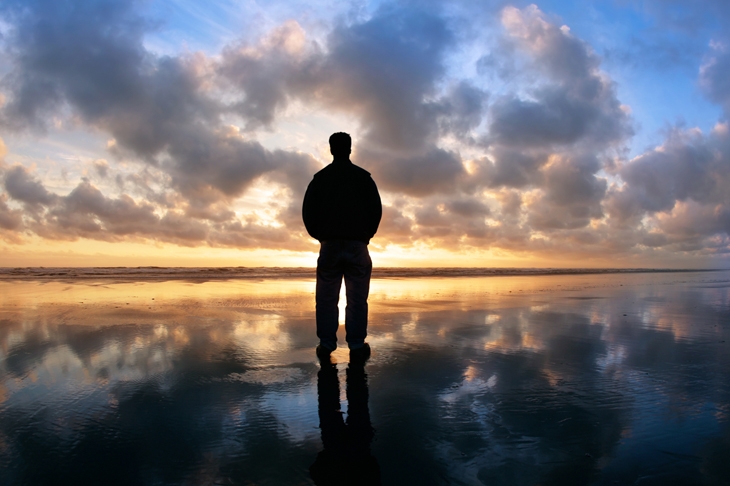After an hour’s beach work I was just about done. I’d read some book, I’d skimmed the papers, I’d eaten some bits of cheese on some oat biscuits (the closest I’ll concede to picnics, which I hate), I’d drunk some water as per my instructions from the Fawn (‘Drink some water! You never drink enough water’), I’d dried off from the swim, I’d got a pair of very numb buttocks after sundry failed attempts to get comfy on the not very flat rock: surely I’d done enough now to earn my release?
But I knew I’d never be allowed to get away with it. Not this soon. The Boy, maybe: he’d be OK with an early escape. Definitely not the Fawn, though. She’d see through my motives straight away. It wasn’t the beach itself that was the problem. Just the fact that there was no wifi or phone signal.
This is a phenomenon fairly unique to British beaches. Last year, on an island in Greece, the mobile reception was better than it is at home in Northamptonshire. Ditto Sicily, the year before. Ditto Bordeaux in May. In fact, thinking about it, I can’t recall anywhere in the world I’ve been recently — from Cluj-Napoca in Romania to Jaffna in Sri Lanka — where the signal and wifi weren’t a gazillion times more reliable than the rubbish we have to put up with at home.
If you’re an addict — as of course we all are — this can cause withdrawal symptoms so you feel like Gene Hackman going cold turkey in French Connection II. The worst I’ve ever experienced was earlier this year when I went to the most remote place in Britain, St Kilda, and had to last a good eight hours completely, totally and utterly without phone reception. If I hadn’t been so distracted with seasickness, I’m not sure how I would have coped.
Here’s the thing, though. If only you can get through those pangs of wracking agony, something remarkable happens. You find yourself entering a state you’ve hardly known since childhood: the empty, listless but ultimately hugely rewarding and productive condition of boredom.
Yes, of course boredom is boring. But it’s precisely because it is so unendurable that the mind quickly seeks out ways of alleviating it. That’s why, for example, in the days when I had a concentration span long enough to write books, I’d always start my working day by pointedly not reading the newspaper. Instead, I’d sit there, ruminating on my granola, gazing vacantly into space, my brain going absolutely nuts with frustration at being denied its fix of distractions. This meant that as soon as I got in front of a keyboard, my fingers were itching to type, my restless brain overbrimming with creativity just waiting to be vomited on to the screen.
And so it was on the beach in Devon. Because Boy and I weren’t allowed to escape, we had to do what generation upon generation had done in this cove before us: make our own entertainment. Everyone around us was in the same predicament. Dogs, shrimp nets, ball games, paperbacks, paddling: it was as ludicrously retro as one of those cod-1930s Great Western Railways posters which affect to pretend that the English seaside still resembles an Enid Blyton novel.
Boy invented — or rather, reinvented — a new game: squirt Dad with bladderwrack. You hold the weed close to your father’s face and pop the bubbles so that the water goes in his eye. Or not. What you discover is that each bladder bursts in a different place — front, back, side — so you never know if you’re going to score a hit or be hoist by your own petard.
This, I’m sure, is how most discoveries through history came about: bored men pissing about (while their irked womenfolk looked on in bemusement and irritation) and accidentally learning more stuff about the world through repetition and trial and error. Why would you ever examine bladder-wrack closely unless you wanted either to eat it (inadvertently discovering, perhaps, that it cures goitres because of its high iodine content) or you wanted to play with it? You could even argue, if you wanted to see a divine purpose in the universe, that God made bladderwrack as weird and addictively entertaining as bubblewrap precisely in order to draw our attention to it…
After the bladderwrack game and the inevitable whack-each-other-with-seaweed game, we repaired briefly to the cliff path so as to get ourselves hot enough for another swim. We watched a pair of peregrine falcons hunting amid the crags. Then, in the middle of the path to the beach, we found a lost, bumbling shrew and marvelled for a good ten minutes at its tininess, cuteness and blithe innocence of the upsetting truth that if it carried on the way it was, it was bound either to get squashed by a family distracted with small kids — or eaten by a raptor.
Finally we swam — a much longer swim this time. So long that the Fawn began worry-ing it would exacerbate the health problem I’ll tell you about one day. But no, I was just blissfully content. When the weather’s warm enough there’s simply nowhere I’d rather swim than the British coast: as crystal clear as anywhere, decidedly more refreshing, and — whatever alarmist marine biologists are telling the tabloids to feed the silly season — absolutely zero shark danger.
As we towelled ourselves dry — or rather as the others did: I have a rule where I don’t use the towel, God knows why — Boy and I exchanged looks. I wish I could say it was the looks of people who’d had an epiphanic experience with nature. But it wasn’t.
‘Can we go home now, Mum?’ he asked. ‘Yes, I suppose so,’ said the Fawn.







Comments